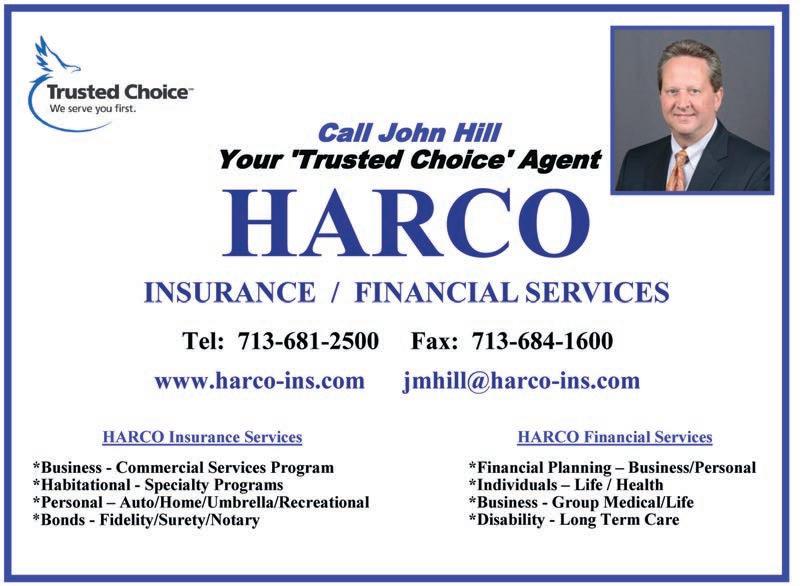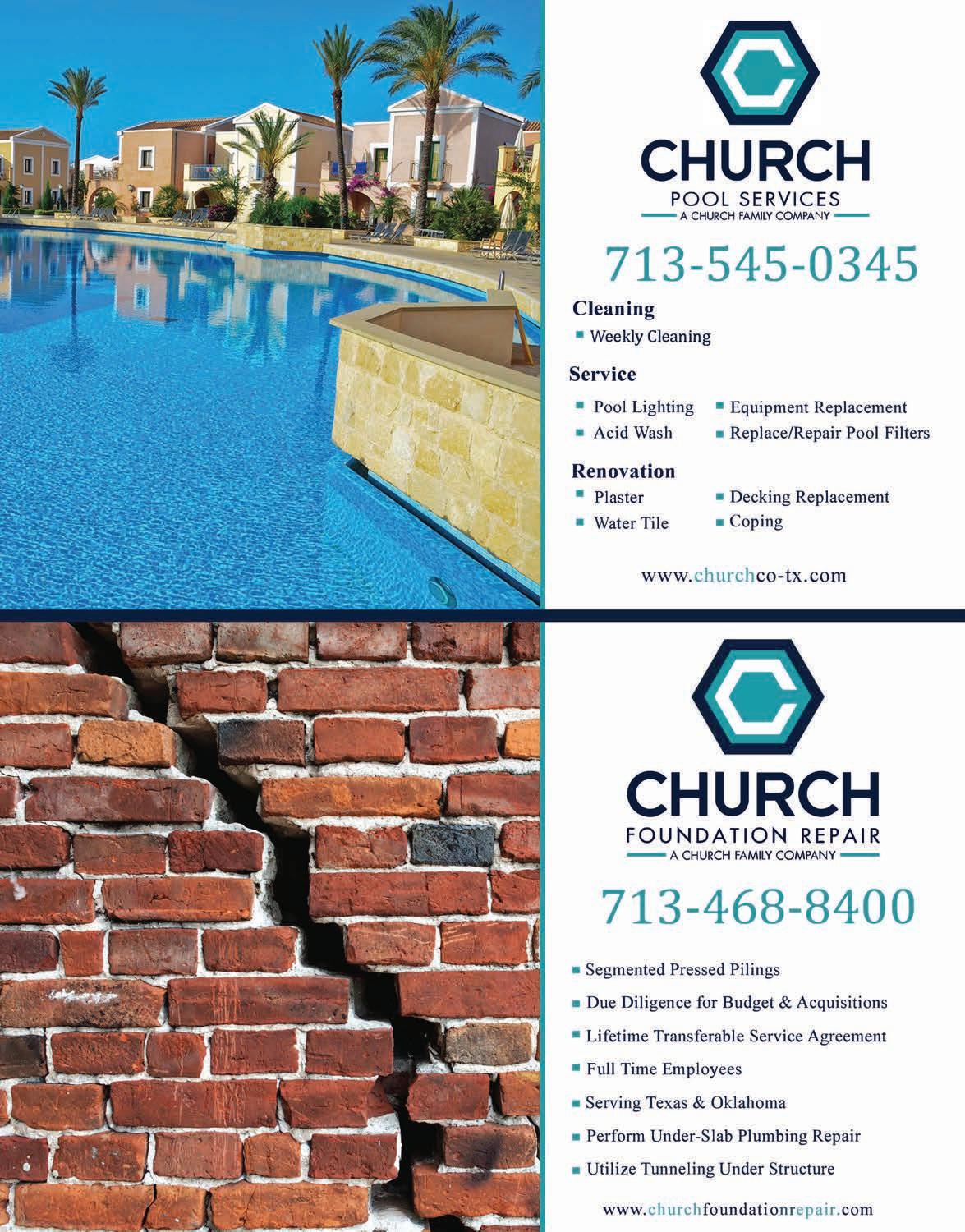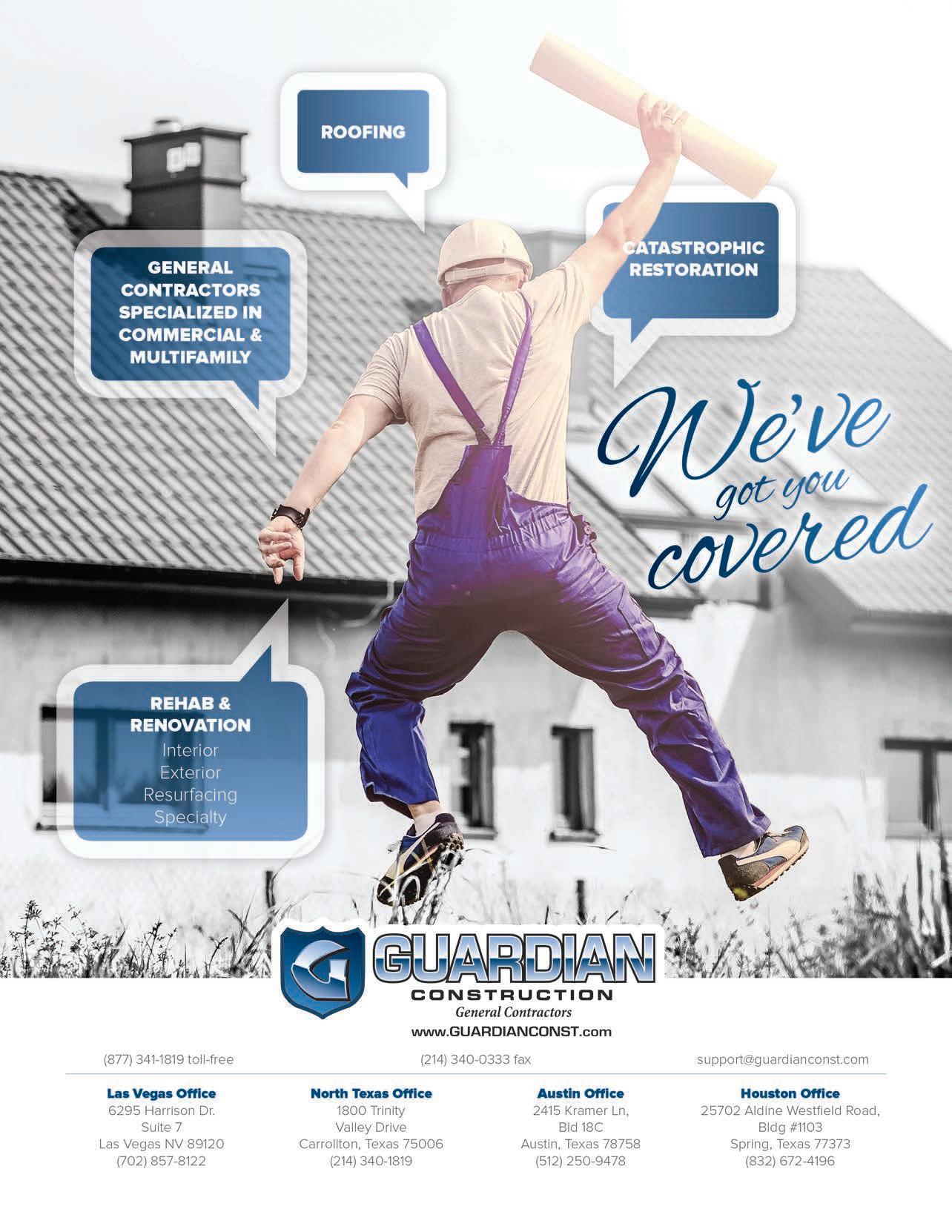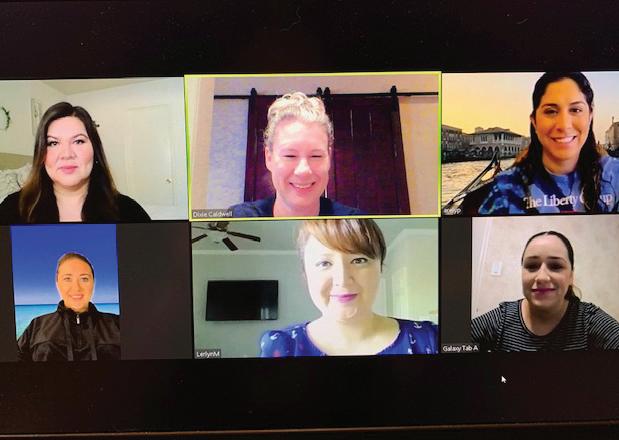
9 minute read
Protecting Apartment
from ABODE May 2020
Learn how to protect yourself, your team and your residents from COVID-19.
By MICHAEL FULWEBER, GEORGE MORRISON and THOMAS POLCYN, Bio-One
A note from the editor: This article was written on March 30. It was edited on April 1. The public health and safety guidelines to protect apartment communities, residents and employees still apply, but the overall COVID-19 situation in Houston may have changed. I t’s vital to follow Centers for Disease Control and Prevention (CDC), United States Environmental Protection Agency (EPA) and Occupational Safety and Health Administration (OSHA) guidelines during this pandemic. The CDC has a dedicated webpage for COVID-19, which can be found at https://www.cdc.gov/coronavirus/2019-ncov/. The Texas Department of Health and Human Services has a COVID-19 page as well, www.dshs.texas.gov/coronavirus/. These pages have a lot of up-to-date information on the status of the coronavirus outbreak, as well as preventative measures and steps to take if you become infected.
Having a deep experience in property disinfection for a range of bacterium infections, (such as the abbreviated MRSA and C. diff), HIV, hepatitis and now coronavirus, this article contains advice to help during these difficult times:
Protecting Your Leasing Office
You likely already have protocols in place to fight this disease. Some communities have closed leasing offices, but others have remained open with a limitation on the number of people admitted at one time. In addition to the personal practices that help prevent spread of the virus, like hand washing for at least 20 seconds, coughing or sneezing into the crook of your elbow, avoiding touching your face (easier said than done), making sure you’re constantly wiping down touch points and hard surfaces with an approved CDC/EPA chemical that is registered to kill the coronavirus. The CDC recommends the use of EPA-registered household disinfectants, a link to those disinfectants can be found here: https://www.epa.gov/pesticide-registration/list-n-disinfectants-use-against-sars-cov-2), many of which are bleach, ammonia or at least 60% alcohol based. Recently in the news, because some people tried to make hand sanitizer from it, Tito’s Vodka is being used by people to make hand sanitizer, but with it being only 40% alcohol, Tito’s is not effective against the coronavirus.
As a safety note: never mix bleach with ammonia or any other cleanser, as toxic gasses can be released. Spray down your work area every 15 to 20 minutes. Immediately spray any area where there is an interaction between people.
Maintain social distances at the six-foot rule and minimize gatherings. Coronavirus is primarily transmitted through droplets from airborne discharge, so remember to cough and sneeze into the crook of your elbow. If you suspect you have contracted the virus, please wear a mask to prevent spreading it to others, and better yet, stay at home.
It’s vital to ensure common areas are sanitized and frequently cleaned. Although residents have the right to refuse to disclose such information, it’s also important to encourage residents to inform management if they are infected, as a courtesy to management and your neighbors. We recommend that you consult your legal counsel for more information.
Resident Infection at your Community
Here is some general guidance from the National Apartment Association on resident infection: If a resident tests positive for the coronavirus and notifies the property owner or manager, the owner or manager should follow the CDC’s guidance and work with health officials. It is the responsibility of the health care provider, not the patient to report cases of disease to health departments and the CDC. A notice to the community may go out in the event a resident or employee with a confirmed case and should be a business decision made with appropriate local counsel. Extreme caution is advised if choosing to make a disclosure because of privacy laws, and the person’s identity to include name or unit number should not be disclosed.
If a resident or employee is known to have contracted COVID-19, there are steps you can take to prevent its spread to adjoining units and common areas. First, though, we believe it is essential to treat the infected resident with care and respect. Because spread is possible before a person shows symptoms, people who have become infected haven’t necessarily done anything wrong, although they may feel distressed and vulnerable, especially when quarantined. This could be a great opportunity to let your residents know that you support them and their health.
With a known infection onsite, we recommend that you call a professional biohazard remediation service immediately to sanitize and clean the common areas and the unit(s) that might be vulnerable to spread. A team will come in and fog these areas with a CDC/EPA approved, hospital grade disinfectant and wipe down all surfaces with a sprayed liquid disinfectant to thoroughly decontaminate.
Allowing a professional to clean and sanitize your community, as opposed to treating your community yourself, will guarantee a healthy and safe community, as professional cleaning companies are trained find the more exotic touchpoints that may not be plainly obvious. Another difference is expert use of fogging to decontaminate porous materials, such as upholstered furniture, drapes and carpets.
Once disinfection is completed by a professional, its critical to set the protocols previously mentioned in place, so that these previously treated areas are not re-contaminated. Inform all residents of the proper protocols. Also, encourage any residents who are ill to remain in their units. Either refer to NAA or your legal counsel on how to manage this. We all want to act legally and ethically during this difficult time. / See Protect, Page 53
Operating During the COVID-19 Crisis: Communicate with Your Peers
A weekly phone call brings onsite staff together to address COVID-19 challenges.
By PAUL BERGERON
When the COVID-19 calamity began to wreak havoc on daily apartment operations about a month ago, Jamin Harkness, CAM, CAPS, executive vice president of The Management Group, Atlanta, knew it would be something he couldn’t handle on his own.
With everyone involved in property management putting out their own fires – mostly the same crisis he was dealing with – he decided to reach out to seven of his closest peer confidantes in the Atlanta area and arrange a one-hour roundtable call. The goal was informationsharing – learn what was working and what lied ahead – for this unprecedented work interruption.
The Management Group is a new, smaller but growing management company that has six communities under development. Call participants represent small-, medium- and large-sized companies. Everyone had something to contribute. For information how to participate, reach out to Harkness at jharkness@tmg-living.com.
The group discussed high-urgency topics such as working with a skeleton crew, renewals, amenities and evictions, among other things, and decided to make the call a regular, weekly thing.
And as the days went by, everywhere they looked, another unique and critical issue arose, so more contributors were needed. Each weighed on their own networks and word of mouth, and by the second week, there were 32 people on the call.
Third Week: 65 Fourth Week: 108
The greater the number of participants, the greater the information. Harkness, who has been in property management since 1997, serves as organizer, moderator and secretary for the 11 a.m. EST calls. Realizing his phone system and general IT capabilities were unable to bring together a group this large, he reached out to Yardi and had them create a platform to help the calls run more smoothly through Zoom Communications.
Realizing that every participant on the call had their own jampacked workday, he firmly kept the calls to a maximum of one hour, allowing each featured presenter 5 minutes of airtime.
Harkness’s latest call recap covered topics such as: • Setting Up Virtual Leasing Offices • Virtual Renewals • Maintenance Team Compensation & Bonuses • The Families First Coronavirus Response Act • Emergency Paid Sick Leave • Flexible Payment Programs • Lender Compliance • Notice to Vacate • Emergency Preparedness • COVID-19 resources And that was just on one call.
“Navigating this storm alone would be unwise,” Harkness said. “I am thankful for my friends and colleagues in Atlanta (and elsewhere who are joining our calls) for giving our group an hour of their time each week. Together, we work through operational challenges, most of which none of us have ever faced. Collectively, we make better decisions and will reach the other side of this crisis with fewer missteps.
“The confidence and assurance gained from gathering industry leaders who I've known and respected for years, learning from them, and talking things out is invaluable during these uncertain times.”
The April 10 call’s agenda (Editor note: This article was submitted on April 6.) already includes paycheck protection programs and selfguided tours. Call participants reach out to Harkness with recommendations of other areas to cover.
A Google Docs folder, including an email contact list of the call participants, was created for sharing documents and expanding on topics from that week’s fast-moving call. Dozens of files can be found in the Google Docs folder – samples from a variety of companies on topics such as apartment policy statements, lists of resources, PPTs, resident communications about operational challenges and other notices. The library grows each week.
Harkness is limiting the call participants to regional-level and above, with various selected consultants, HR directors and attorneys, as well. “We’ve invited a few suppliers, but politely have asked them to remain mute,” he said.
“There’s no playbook for dealing like a crisis such as this,” said 2020 NAA Chairman of the Board, Mike Holmes, and President, Easlan Management, Greenville, S.C. “We’re a competitive industry, but in times like this, it’s so commendable that our owners, managers and suppliers are able to come together, circle the wagons, and fight for our industry, sharing forms and materials with no restrictions.
“Calls like these do help to minimize the uncertainty when great minds are working together to find solutions, even for problems that maybe some didn’t even think were out there. Groups doing this like NAA, NMHC and Grace Hill as well as those at the local level across the country should be thanked.”
For information how to participate, please reach out to Jamin Harkness at jharkness@tmg-living.com.
For local COVID-19 resources, visit the Houston Apartent Association website at www.haaonline.org.
Paul Bergeron is a freelance reporter who has covered apartment management for more than 20 years, most recently for the National Apartment Association. He can be reached at pbergeron333@gmail.com.

Here’s a little secret you should know: contrary to common perception, residents will not live anywhere just to save a buck. You need to stand out in an overloaded marketplace by matching the expectations of today’s residents with your own business plans.








